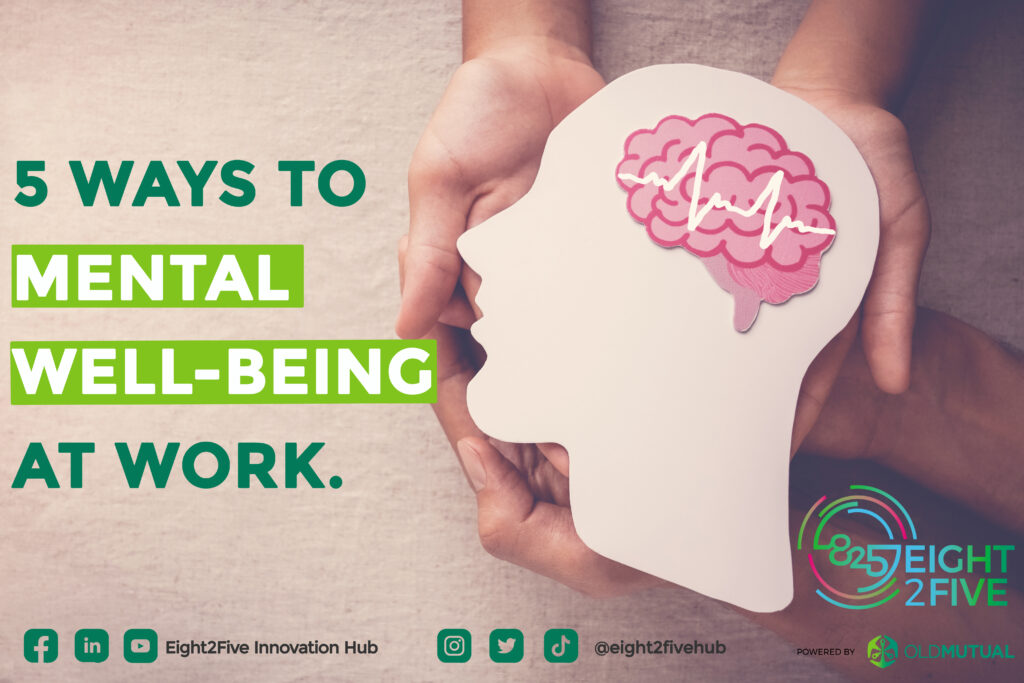The World Health Organization (WHO) estimates that depression and anxiety cost the global economy $1 trillion per year in lost productivity proving that mental well-being at work is one of the most valuable assets for businesses to thrive. Oftentimes, people experiencing mental illness either miss work or get less done on the job, a behavior referred to as presenteeism – when people go to work while struggling with physical or mental health issues. Workplaces that prioritize mental health have better engagement, reduced absenteeism, and higher productivity as people have improved well-being, greater morale, and higher job satisfaction. This is why focusing on workplace mental health is so important for the bottom line.
There are ways to improve mental well-being at work, whether the job is somewhat stressful or rife with conflict and problems. Each year, the month of May is designated for mental health awareness thus we’ve taken the liberty to share ways businesses can ensure mental wellbeing at workplaces.
Invest in mental health education to better understand how it affects your workforce.
Having the correct information about mental health from reliable sources is key to ensuring that company leaders and workers maintain a healthy workspace. It is advised to make mental health training mandatory for company leaders to help them be more aware of and invested in this aspect of their employees’ well-being. There are several resources available for learning about mental health that leaders may share with their teams on how to screen for it, prevention of serious complications, and ways to get help. One way would be starting a company-wide dialogue about how management or communication practices can be improved to reduce stress and improve collaboration among colleagues to improve mental health in the workplace. Leaders could also invite mental health experts to talk about stress-management tactics or offer employees the proper tools to gauge and improve their mental wellness.
Encourage physical activity and exercise in your workforce
Being physically active, including at work, improves physical health and can improve mood and well-being and decrease stress, depression, and anxiety. Physical activity is scientifically proven to combat psychological conditions like anxiety and depression. However, a staggering 80% of adults don’t get their daily recommended amount of aerobic and muscle-strengthening exercise.
Inasmuch as it is important to work hard, take frequent, short breaks to stretch, walk around the office or outside (just move somewhere, somehow), breathe deeply, drink water, and eat a nutritious snack. Doing small, healthy things rejuvenates you in big ways. Also, if you can listen to music while working, do so, as music has been proven to influence mood and decrease stress.
Form human connections at your workplace
Sometimes, work makes people feel more isolated even though others are around. Stress can make everyone impatient and irritable just as anxiety, too, keeps people apart. Studies, though, highlight the importance of strong social connections to our mental health and well-being. If you feel disconnected, change that. Start by reaching out to just one coworker. You don’t have to host office parties to form good relationships that foster mental well-being at work.
Show gratitude and recognition to your workmates
Carrying out acts of kindness, whether small or large, can increase happiness, satisfaction, and a general sense of wellbeing. Showing recognition to a manager, employee, or colleague is as simple as dropping off a hand-written thank-you note on their desk or offering a free coffee. Companies can do one better, and offer employees a simple way to reward teammates using a rewards product that makes recognition simple, meaningful, and frequent. Building a culture of recognition reduces stress, builds stronger bonds between teammates, and establishes a generally positive and motivational environment for employees to thrive.
Intentionally develop your values and sense of purpose
Paying more attention to the present moment, to thoughts and feelings, and to the world around, us boosts our wellbeing. While all five of these tips are important and effective, this one would be it if you had to choose only one. Knowing your greater purpose makes many things much more tolerable. You can journal your thoughts, create a vision board, represent them with a photo collage, or list them neatly on an index card or in a program like Evernote. Getting your values and purpose out of your head and out in front of you makes them more real. You can see why you’re going to work day after day. When you know your reason, you can cope with situations you can’t change because you know you’re doing it for a greater purpose in your life. Not only does this improve your mental well-being at work (and everywhere else), it is mental health and well-being itself.
In conclusion, realistically, work-induced stress won’t completely disappear. Instead of trying to get rid of it, companies can guide employees in developing healthy daily routines that enable them to reach their physical and mental wellness goals in the long run, implementing an effective employee wellness program allows companies to engage employees to produce the best work possible. And remember: leadership sets the tone, at Eight2Five Innovation Hub we intentionally set aside Mondays for mental health well-being sessions for our hub members and it has improved community wellness.
References:
1.https://mentalhealth.org.nz/workplaces/working-well-guide-and-resources/enhancing-mental-wellbeing
2.https://www.understood.org/en/articles/workplace-mental-health-5-ways-to-support-employee-wellness
3.https://www.healthyplace.com/self-help/self-help-information/5-ways-improve-mental-wellbeing-work
4.https://www.fond.co/blog/6-mental-health-workplace/

